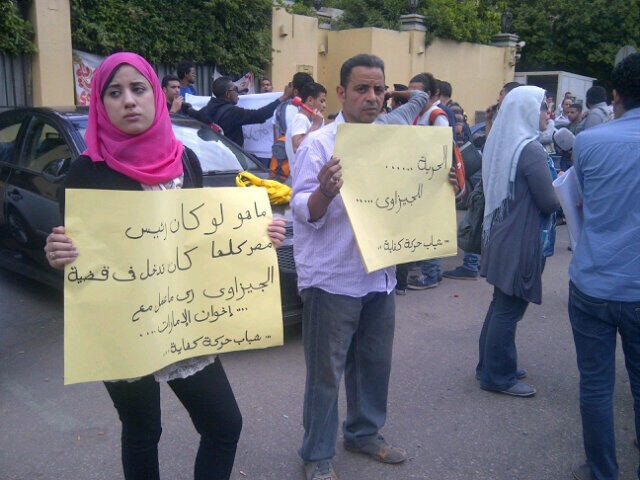By Heba Fahmy
CAIRO: Judges and lawyers filed complaints at the Prosecutor General against head of the Cairo Appeals Court Abdel Moez Ibrahim for his alleged responsibility for lifting the travel ban off non-Egyptian defendants in the NGO case.
“A number of judges filed a complaint over the past couple of days against Ibrahim and the three judges who decided to lift the travel ban off the foreign defendants illegally,” Judge Zakaria Abdel Aziz, of the Cairo Appeals Court and former head of the Judges Club, told Daily News Egypt on Monday.
The judges considered the decision to lift the travel ban an infringement on judicial independence.
Lawyer Negad Al-Borai, representing some of the foreign defendants, previously told DNE that a new panel of judges was assigned and that it issued the decision, while other defense lawyers on the case said that the grievances department issued the decision after the panel of judges reviewing the case recused itself.
“This so-called grievance department was formed [illegally] by Ibrahim to lift the travel ban after the panel of judges reviewing the case refused to do so,” Abdel Aziz said.
On the other hand, civil society lawyer volunteering in the case and general coordinator of the Association of Lawyers for Saving Egypt, Khaled Suleiman, said that the names of the three judges coerced into lifting the ban in exchange for bail remained confidential.
“After they issued the order, the panel of judges was disbanded…these actions are flagrant violations of the law,” he said.
Only 14 Egyptian defendants attended the court session held last week and were placed inside the dock, in accordance with procedures.
A total of 43 civil society workers, including 16 Americans are accused in the case of operating the NGOs without a license and receiving illicit foreign funds.
Last week, the panel of judges headed by Judge Mahmoud Mohamed Shoukry recused itself from the case, expressing “unease” in carrying on with the trial.
Ibrahim said in a state TV interview that Shoukry’s son was the reason behind the panel’s decision, because he had worked in an international consulting company that had links with the US Embassy and civil society organizations, posing a conflict of interest.
However, Shourky denied that his son’s work was linked to the US Embassy or civil society organization, adding that it had nothing to do with the panel’s decision to recuse itself.
Civil society lawyer, Osman El-Hefnawy, representing Hamada Shaaban, general director at the Ministry of Housing, said that the Lawyers’ Syndicate also presented a complaint against Ibrahim, Field Marshal Hussein Tantawi, and Fayza Aboul Naga, the international cooperation minister, known to be the driving force behind the initial investigations.
“Tantawi acts as the president and used his influence to lift the travel ban in response to US pressures,” El-Hefnawy said. “Ibrahim was used as a scapegoat in this case.”
A new panel of judges has been assigned to hear the trial this Thursday, days after six Americans among those charged flew out of the country with nearly $5 million in bail, the state-run news agency MENA reported Saturday.
The announcement came as US officials described the US-Egyptian relationship as “strong” and said that Washington would help Cairo support the efforts of the International Monetary Fund to conclude an economic reform package, indicating that the worst crisis in the two countries’ relationship in decades was on the mend.
But on the internal front, the decision to lift the ban outraged many, who believed Egyptian authorities folded under US pressure in complete disregard of judicial independence.
Despite the trial’s rough start, judges and lawyers expected that the “political” case would be reviewed by the new panel in a fair manner, without being pressured by authorities.
“Our judiciary system is intact, as Judge Shoukry and the rest of the panel recused themselves, refusing to be coerced and pressured by authorities,” El-Hefnawy said.
“Our courts will review this case justly and legally despite it being political,” said former head of Alexandria Cassation Court, Justice Ahmed Mekky.
Civil society lawyers believed that the non-Egyptian defendants wouldn’t return for the trial, despite reports that they signed documents pledging to attend the next hearing. Only one American defendant remained in Egypt while the rest were flown back home in a special US plane.
“The way they were smuggled out of the country guarantees that they will never return, and any verdict issued against them will be completely useless,” said Suleiman.
However defense lawyer Tawhid Ramzy, representing defendants affiliated with the International Republican Institute (IRI), refuted these claims, saying that the court could order the defendants back to Egypt with its verdict.
“These complaints against Ibrahim won’t affect the case or weaken my clients’ positions,” he added.

